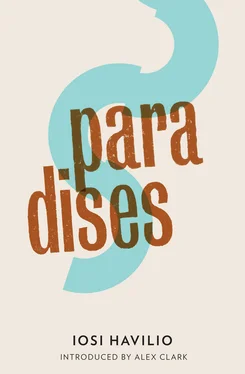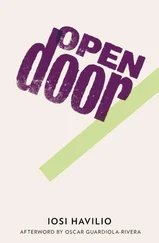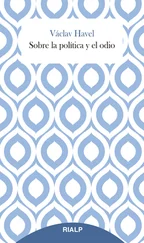Iosi Havilio - Paradises
Здесь есть возможность читать онлайн «Iosi Havilio - Paradises» весь текст электронной книги совершенно бесплатно (целиком полную версию без сокращений). В некоторых случаях можно слушать аудио, скачать через торрент в формате fb2 и присутствует краткое содержание. Год выпуска: 2013, Издательство: And Other Stories, Жанр: Современная проза, на английском языке. Описание произведения, (предисловие) а так же отзывы посетителей доступны на портале библиотеки ЛибКат.
- Название:Paradises
- Автор:
- Издательство:And Other Stories
- Жанр:
- Год:2013
- ISBN:нет данных
- Рейтинг книги:3 / 5. Голосов: 1
-
Избранное:Добавить в избранное
- Отзывы:
-
Ваша оценка:
- 60
- 1
- 2
- 3
- 4
- 5
Paradises: краткое содержание, описание и аннотация
Предлагаем к чтению аннотацию, описание, краткое содержание или предисловие (зависит от того, что написал сам автор книги «Paradises»). Если вы не нашли необходимую информацию о книге — напишите в комментариях, мы постараемся отыскать её.
is an almost perfect novel." — Albert Camus's
reimagined with a female lead in in twenty-first-century Buenos Aires.
Recently widowed, a young woman leaves the countryside for Buenos Aires with her four-year-old son where she seeks to build a new life for herself. She finds work in the zoo and moves into the human zoo of a squatted tower block at the invitation of one of its residents, to whom she acts as nurse, giving morphine injections.
Paradises — читать онлайн бесплатно полную книгу (весь текст) целиком
Ниже представлен текст книги, разбитый по страницам. Система сохранения места последней прочитанной страницы, позволяет с удобством читать онлайн бесплатно книгу «Paradises», без необходимости каждый раз заново искать на чём Вы остановились. Поставьте закладку, и сможете в любой момент перейти на страницу, на которой закончили чтение.
Интервал:
Закладка:
First, it occurs to me to drop into Tosca’s, she must be awake by now. We leave Simón in Herbert’s care, giving him instructions not to let the cloth fall off his forehead. As we descend, Sonia tells me about poison beads. They are the fruit of the paradise tree, they come in through the window, she says and concludes: In large quantities they can make you retarded or paralytic. I enter without knocking. Tosca is watching television, Benito is sleeping at her feet, curled up on the floor like a fairy-tale pet. I explain the situation. Die, he won’t die, says Tosca and repeats what Sonia said: We need to find out how many he swallowed, the best thing is to take him to hospital to have his stomach pumped. And looking me in the eye: Inject me, girl, hurry, then go, you never know what might happen.
Upstairs again, we wrap him up well and I carry him to the street. Mercedes is waiting for us at the entrance to the building at the wheel of his fake taxi. Sonia comes with us too, Herbert stays on the pavement, he says goodbye with his arm raised and his lips drooping, annoyed at not being allowed to come along. The car journey is torture, Simón keeps vomiting that phlegmy cream and I’m not always successful in getting his head out of the window. He dirties his clothes, my legs, the upholstery too. Mercedes complains in a low voice. He curses in his own language, that sharp Guaraní he uses at times, and accelerates, ignoring the traffic lights.
Sonia decides for me, we’re going to the hospital where she works. The doctors are good, she says, and she silences me when I say I think it would be better to go to the children’s hospital. It’s not very far, ten, fifteen minutes, it feels like a century. We go through a tunnel underneath the railway lines and come out on a very wide road between a piece of wasteland with weed-covered ruins and a supermarket as big as an airport. Further away, there’s a group of high-rises with balconies overlooking the void. I look so that I don’t have to think.
I get out of the car carrying Simón in my arms as if he’s war-wounded. The hospital signs calm me: A&E, X-rays, Haemotherapy. There’s no way we can be seen quickly, in spite of Sonia’s influence. None of her acquaintances are around. They’re all new doctors, she complains. At the paediatric emergency window they ask me for Simón’s symptoms. What’s he got, that’s what they say. High fever, we can’t bring it down with anything. They register us, no one shows their face but they did warn me: You’ll have to wait a while. We have an emergency, a boy who’s really serious.
Three quarters of an hour until we are called by a tiny female doctor. I tell her: vomiting, fever, convulsions. Any history? I don’t know whether to tell her about the poison beads. She strips him, takes his temperature, listens to his heart, checks his eyes, his ears, listens to his breathing and finally, as I’m dressing him again, she puts a syringe full of a pink liquid in his mouth. Seven point five, remember in case they ask you. I pluck up courage: My neighbour says it could be these, I say and show her a couple of the little balls I brought in my pocket. They call them poison beads, I murmur, I think he’s eaten some. The doctor observes them without touching. Ok, she says, disregarding my contribution. First we’ll do some tests and then we’ll see. In any case, we’ll check with toxicology later.
We stay in the small consulting room, Simón lying on the stretcher, me, standing, unable to move much because of the passing nurses, doctors, more patients. A girl with a cut on her forehead, another with a sharp pain in her groin that won’t allow her to stand up straight and a blond boy with lots of teeth and a dislocated elbow. Since there’s no orthopaedic specialist in paediatrics they’re going to be waiting a good while until the adult consultant, with a twisting and flexing manoeuvre, slips the bone, after two refusals, back into place. Magic.
When I’m beginning to suspect the doctor has forgotten about us, she comes up from behind with an order for a blood test for Simón. We take a number in the clinic, it’s at forty-five and we are seventy-three. I entertain myself with the mobile, the calendar, the games, the alarms. A girl with Yessica’s hair passes and I remember the vipers, I clearly won’t be able to go to work. I send a message to Iris so she can let them know, Simón sick, I write, and her reply: Serious? I don’t answer. We get a friendly male nurse with a thin moustache and swollen bags under his eyes. He uses a rubber dinosaur to try to distract Simón, who is still half zombie, incapable of anything. It isn’t easy to find a good vein, the man sweats, switches arms, from left to right, he scratches around with the needle, Simón cries and kicks his legs as much as his strength will allow him. Then he surrenders. I wonder whether it’s really necessary to poke about quite so much, if there isn’t something brutal about this way of doing it. Looking around, the tubes, the drips, I find it hard to believe that there isn’t a more modern method. The man puffs, he grabs his head, it seems like he’s about to give up and just then, that red, dark, thick liquid Simón has inside him which I’ve never seen before begins to run along the tube. The nurse covers the puncture with lint and warns me: Don’t be scared if he gets a bruise, it’s normal. With a filled test tube and a note saying Urgent, he sends us to the central laboratory.
Three flights of stairs, I knock several times at a flaking door until a side window is opened. A horrible man with the worst breath ever sticks his head out. Do I look deaf? I apologise and hand him the blood. The machine isn’t working, I can’t promise you anything, he says and shuts the window in my face. We wait on a bench with our feet dangling. I don’t know how long. Simón curls up using me as a backrest, I read and reread a poster about the prevention of sudden death syndrome.
With the results of the analysis in my hand, we return to A&E. On the way I see the doctor who attended us, minus her apron, in sandals and miniskirt. She is in a hurry, tapping at her mobile, I intercept her as she’s getting into her car. She can’t place me immediately, I help her: The boy with the poison beads, I say. Ah, yes, sorry, I didn’t tell you, the guys from toxicology, so she calls them, are at a conference, they’ll be back tomorrow, so you’ll have to wait. I have the test results, I say and show her. The white cell count is a bit high, we’ll need to keep an eye on that, she says. Take it to the head of A&E. Meanwhile we’ll keep him under observation. Don’t worry, it’ll be fine, it might just be a bad virus. Or a bit of stress, but best to be sure. I can’t work out whether the stress thing is serious or a joke.
Simón gets hot again. Another syringe of paracetamol and he falls asleep by himself, without pats or caresses. He takes a nap on a stretcher and I wait in an adjoining room with very high ceilings. I could also willingly fall asleep. A woman speaks to me from behind, I hear her voice before I see her face: What did they find? Nothing, he’s got food poisoning, I say with determination and the woman looks at me doubtfully. If they’re keeping him in it must be for something, they don’t have beds to spare here. I’m about to say that he hasn’t been admitted yet, that he’s just under observation, but I stay quiet. Mirta introduces herself and indicates a door with a bronze plaque that says Mothers’ Room. In there you’ve got a kitchen, TV, fridge, there aren’t many of us today, there will certainly be room for you to stay. There are some armchairs, failing that, the air beds. She takes me by the arm, she wants me to see. I don’t go in, I glance in from the door: a strong smell of fried food. The vapour leaves a trail like a jet plane. I locate the origin: a spitting pan on a hob just below the wall-mounted television. Around an oval table two women are drinking maté , engrossed in the news, one of them very old, the grandmother of some child, I think, the other almost still adolescent, a sister or premature mother. Mirta insists on showing me the facilities: There are hot showers from seven to ten, the laundry is at the back. There, she says, pointing out two trunks, is where the blankets are kept. In a low voice: Keep an eye on your things, there’s always a thief lurking about. The clothes horse was swiped yesterday. Back in the corridor, without my asking, Mirta tells me she came in for a consultation about some spots that appeared on her son’s face and he’s been here three months. His cheeks went red, his lips swelled and his temperature rose every night. First they told me it was a virus, then that it was an allergy, they did some X-rays and an electrocardiogram and they discovered a heart murmur. In the end they came up with Kawasaki syndrome. Do you know what that is, she asks. I shake my head but she doesn’t tell me, she moves her hand like a windscreen wiper giving me to understand that it makes no sense for her to explain. They’ve already given him two bypasses, chronic cardiac insufficiency. It looks like we’re heading for a transplant, she says in a strange tone, almost proud, as if the gravity of the situation gives her a certain status. It’s not easy to find a donor of his age.
Читать дальшеИнтервал:
Закладка:
Похожие книги на «Paradises»
Представляем Вашему вниманию похожие книги на «Paradises» списком для выбора. Мы отобрали схожую по названию и смыслу литературу в надежде предоставить читателям больше вариантов отыскать новые, интересные, ещё непрочитанные произведения.
Обсуждение, отзывы о книге «Paradises» и просто собственные мнения читателей. Оставьте ваши комментарии, напишите, что Вы думаете о произведении, его смысле или главных героях. Укажите что конкретно понравилось, а что нет, и почему Вы так считаете.











